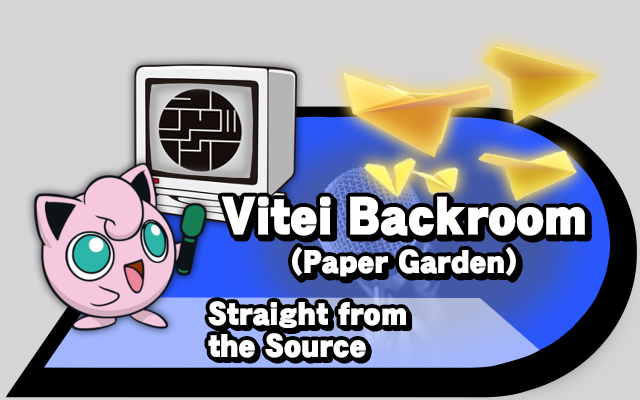Note:
CM = Chris McLaughlin
PM = Pauline Machabert
JC = Jetha Chan
Table of Contents:
Page 1 — Introductions and History
Page 2 — Working in the Backroom
Page 3 — Backroom vs. Frontroom and Creative Freedom
Page 4 — Throwing Chickens in VR
Page 5 — How to Organize a Flat Company
Page 6 — Escaping Nintendo’s Shadow
Page 7 — Wrapping up the Party
Page 2 — Working in the Backroom
So what’s it like working in the Frontroom versus working in the Backroom? It seems like the Frontroom is very structure whereas the Backroom is the complete opposite.
JC: Ironically, there’s more structure here on a day to day basis here in the Backroom. Here in the Backroom, we have a daily standup around ten. Then we have another meeting sometime in the afternoon like, ‘is anyone blocked? Does anyone need any help? Did everyone have a good day?’ Whereas in the Frontroom we would only have one meeting a week…on Friday afternoons. You could go the entire week diving deep in your task without ever actually talking about it which is good or bad.
I guess it’s bad if you need that help or that outside…
JC: Of course, it’d be on you for looking for that help. There’s this social pressure in meetings [in the Frontroom and the Backroom] like ‘I’m doing badly, I need some help’. There’s something about meetings that force you to spit it out instead of thinking, ‘maybe I just had a bad day. Maybe I can just pull it out tomorrow and no one will notice’ – you can’t do that when you have daily meetings which is good.
So you guys obviously communicate a lot.
JC: Oh yeah.
Which is different from a typical Japanese games company from what I heard…
CM: From what I’ve heard. [laughs]
PM: We don’t really know [laughs]
CM: I think it’s different from a lot of games companies. Especially with the Backroom, it took us four years to get to this point. I wouldn’t say we were mismanaged or we had problems but now it’s very clear what the work is, and everyone knows what everyone else is doing. Before the daily meetings, there would be times where people would go a week being stuck, or you would realize someone did something and think ‘why did you do that? I’ve done that as well’.
It’s an ongoing process. It took us some time to get where I think everyone was comfortable and when we have people come in…there’s not so much red tape or overhead to explain. It’s basically if you are in this room [points upstairs], you can’t avoid the meetings. [laughs]. Ideally, all the meetings are short and I think it works well.
I think with this type of company structure it really depends on the type of people you are working with. One person could really drag the rest of the team down…
CM: Exactly. Because the company is so small, everybody has to do multiple things and everyone has to know what everyone else is doing because there’s not time to waste time.
You need that clear coordination…that clear communication…
CM: Yeah.
That has been an issue before, but things have kind of ironed themselves out then?
CM: Definitely. I can’t think of any specific examples but generally. Someone is working on something and someone else is working on it as well. Or, we’d get a week before the deadline, and you are like, ‘hang on, there’s this thing. I thought you were doing it’ ‘No, I thought you were doing it’ ‘Well someone has to do it right now because this is due.’
I was talking to Pauline about this during BitSummit, but Vitei has a company culture against crunch…is that true? If you have to crunch one week then maybe you can take the next week off?
CM: Essentially the rule is if you get your work done, they don’t care what you do with the rest of your time. But there’s always plenty of work. I’ve worked on a lot of games for a long time, and had some crunch heavy projects in the past…and for me, that’s something I want to push against wherever I’m working. Just for me, some people can deal with 10 hour days or 12 hour days… and be fine for a while…but maybe I’m getting old but the next day if I’m doing 12 hour day then I’m like ‘why am I here?’ tired.
If you lose your sleep you will lose you mental functionality…
CM: I feel it really it fast. I know some people who can be fine with a week but within a day or two, then I feel it and need a day off to recover. So if I can avoid it for my sake…I guess it’s kind of selfish…I just want to make sure I don’t get tired [laughs].
Do you feel that the Backroom is a dream job for those in the games industry that other companies should emulate or does it exist, uniquely?
CM: I think it’s a dream job..it’s definitely the best job I’ve ever had. Uhh…sure.
PM: It is.
JC: That’s a good question. It’s definitely the best work environment I’ve ever had. Best job…yeah…actually, maybe.
CM: It’s okay, you haven’t been here long enough to make that decision.
JC: That’s true. Actually, come to think of it, it’s kind of hard to say. A lot my time at Vitei has been colored by my Frontroom experiences. Not to say it was bad or anything but it’s different.
…“life finds a way” on the next page.
- Smash Ultimate Development Timeline - May 16, 2020
- Straight from the Source: Koji Igarashi on Castlevania in Smash, Bloodstained - October 16, 2018
- Sakurai Discusses Isabelle, Echoes, and Newcomers - September 26, 2018








